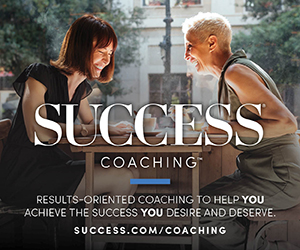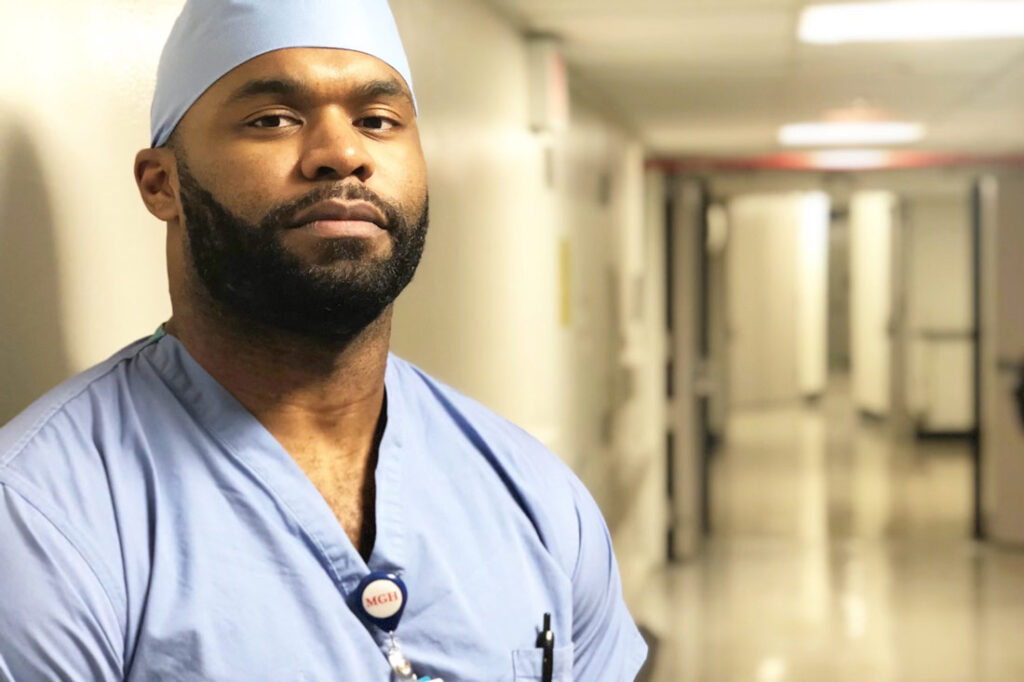There are more than a million high school football players, but very few of them ever make the NFL—only about 300 athletes join the league each year. The number is similarly miniscule for neurosurgeons. According to the American Association of Neurological Surgeons, there are roughly just 3,500 currently practicing in hospitals throughout the United States. So it defies statistics and reason that someone would or could ever do both—that they’d play in the NFL and become a neurosurgeon. But Dr. Myron Rolle has.
Rolle—which is pronounced “like rock and roll, sushi roll,” he chuckles—will be the first to admit that he’s had a pretty incredible career. But he also hesitates to take too much of the credit himself.
“I got here, really, from my parents,” he says. “My folks were immigrants from the Bahamas, and they stressed the importance of academic excellence, being good citizens, leadership, having an altruistic spirit. They had all of that, and infused all of that into me and my four older brothers when they got to America.”
A strong support system at home
Growing up, Rolle says he knew that he’d be celebrated at home if he got good grades in school (which he did, maintaining a 4.0 GPA throughout high school), or excelled in extracurricular activities like football (which he did, as an All-American athlete ranked by ESPN as the No. 1 high school prospect in the nation). Rolle did have a drive to succeed, but he emphasizes that it was his parents who really fueled his athletic and academic accomplishments.
“They gave me praise, and they poured love into me early and often,” he says. “They never told me, regardless of the fact that we have darker skin, or don’t have a whole lot of money, and we come from a very small country in the Bahamas, that we couldn’t be successful in America. I always held strong to that.”
Early in his childhood, Rolle remembers reading about Ben Carson, the Black surgeon and academic who led the team at Johns Hopkins that successfully separated twins joined at their occipital lobe. He saw himself in Carson, a Black man who also came from a large family and had a similarly humble childhood. “In fifth grade, I knew I wanted to be a part of that science,” he recalls.
Myron Rolle’s undeniable talent
But first: football. While he says his parents were strict about education coming first—if a school project wasn’t done, Rolle wasn’t going to the game—his gifts on the field were hard to ignore. As a high school student, Rolle received not only national attention and acclaim, but scholarships that would eventually help pay for his education at Florida State University.
Even at FSU, where his football career blossomed, Rolle never abandoned his academic aspirations. He played safety for the Seminoles, at the same time completing the necessary pre-med requirements, and earned his bachelor’s degree in exercise science in just two and a half years. The Tennessee Titans selected him in the sixth round of the 2010 NFL draft—but only after Rolle became a Rhodes Scholar, which allowed him to study medical anthropology at Oxford for the 2009-2010 academic year.
Rolle left the NFL after three years, and says he’s lucky that he was healthy enough to study medicine. In fact, he says his football career was a tremendous help in getting him to his current position as a Global Neurosurgery Fellow at Harvard Medical School.
“I credit football a lot for my success as a physician, as a healer, as a leader, because it taught me some valuable traits that I still use in the operating room and around nurses and patients and my colleagues,” he says.
From the field to the operating table
Communication is key on the football field and in the hospital halls, as is being disciplined and knowing how to prepare for each case. You have to be coachable and ready to take constructive criticism without fighting back, faltering or losing sight of your goals. And then, there’s also the rote, repetitive training and learning that’s as important on the field as it is in the operating room: a lot of reading and studying, working on his dexterity, “tying knots while I’m watching Rachel Maddow.”
“And honestly, dealing with pressure,” Rolle adds. “There’s a lot of moments in neurosurgery when you’re near the brain, the brain stem, brain vessels, the spinal cord, and something can go wrong. But you have to take a breath, take a second, go back to your fundamentals and get the job done.”
And of course, teamwork is hugely important for neurosurgeons. (Carson led a team of 70 people when he separated the conjoined twins in 1987.)
“I was a safety on the football field, so I had to be able to get 11 guys together on the field and say, ‘Look. We have a collective goal. We all come from different places, we all listen to different music, we all do things differently, but when that ball is snapped, we need to be on the same accord,’” Rolle says. “I take that same leadership and teamwork approach into the operating room, where we all come from different walks and different parts of the world, but at the end of the day, we got a patient on the operating room table that needs all of our characteristics and all our skills and talent to help save their life.”
Myron Rolle’s new book
Now, sure, there might be similarities between football and neurosurgery, but at this point you’re almost certainly thinking to yourself, This guy is just some kind of… one in a million, near-superhero type.
Rolle doesn’t see it that way at all. In addition to all the credit he gives his parents, the athlete-slash-surgeon says he has Mickey Andrews, who was FSU’s defensive coordinator for 26 seasons, to thank.
“He would challenge me and my teammates to get 2% better every day on the field,” Rolle explains. The idea was that small steps towards improvement—whether it was in backpedaling, tackling or disguising the coverage—would have big impacts over a long period of time. Rolle has applied Andrews’ coaching method to several other areas of his life, and it’s the title to his book, released last year: The 2% Way: How a Philosophy of Small Improvements Took Me to Oxford, the NFL, and Neurosurgery.
“It was a way to keep us accountable, and it was a way to feel like you were making gains,” Rolle explains. “I took that ideology and extrapolated it to life. Small steps, small wins, six months or a year from now, adding those small gains up and seeing how far you’ve come. I’ve taken that to my personal life as a father and a husband, I’ve taken it to my professional life in surgery.”
Part memoir and part self-help book, The 2% Way weaves Rolle’s incredible life story alongside his message about small steps towards self-improvement. He talks about the challenges of feeling like you don’t belong, from his times as a New Jersey prep school kid thrust into the chaos of Florida State, to the more recent past, walking into hospital rooms as a surgeon and having patients ask him to take away their dinner tray.
Dr. Myron Rolle as role model
His goal is to show that his life, while it may look incredible from the outside, has been as full of challenges as anyone’s. He also wants to demonstrate that though the urge to compare ourselves to others makes sense—whether they’re people on Instagram whose lives look perfect, or total strangers who are NFL athletes-slash-neurosurgeons—it won’t help you. The 2% Way encourages readers to focus on themselves and how to quiet the background noise.
Rolle, who grew up reading about and idolizing Black men from Ben Carson to Kofi Annan to Malcolm X to Booker T. Washington, says it’s a powerful thing to be able to share his story with people in such a personal and meaningful way. “My daddy gave me these books to read, and I read about all of these Black men who were doing wonderful things, and they said, ‘You can do that, too,’” he says.
So while it’s deeply rewarding to save lives in his neurosurgery career, for Rolle, one of the “gems of this journey” has been to have the opportunity to act as a role model for other young Black people, and to share that experience in a book of his own.
“I love it and I love to be able to help people in that way. But there’s something else on this journey that fires me up, and it’s the fact that I can be a representative of immigrant children, of Black men, of coming from a public institution like Florida State… and where it can take you. If I can set that example so that other people younger than me can see me, feel me, read my story, see themselves in my story, and then apply themselves to a goal beyond where I am, then I’ve done a good service.”
Photo courtesy of Dr. Myron Rolle.



